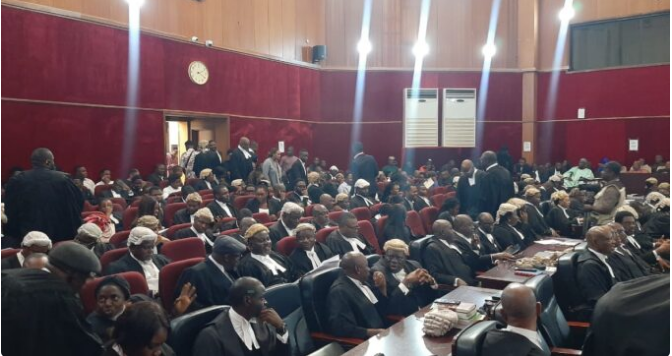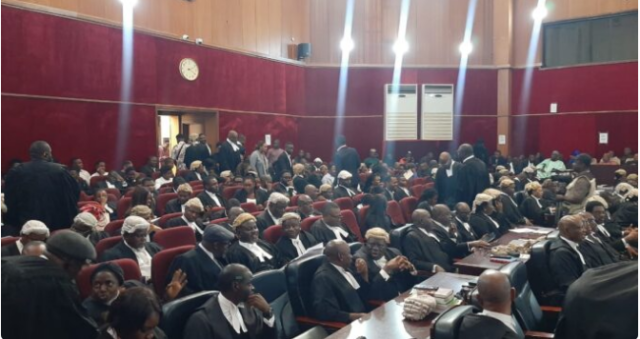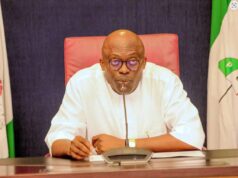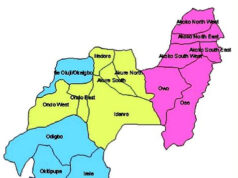
In a few weeks, the presidential election petitions tribunal will deliver judgment in the suits challenging President Bola Tinubu’s victory in the February 2023 presidential election.
Tinubu secured 8,794,726 votes to defeat Atiku Abubakar of the Peoples Democratic Party (PDP) who got 6,984,520, and Peter Obi of the Labour Party (LP) who polled 6,101,533 votes.
While Obi said he was “robbed” of victory and vowed to “prove it to Nigerians”, Atiku described the outcome as “a rape of democracy”.
The PDP candidate also expressed doubts about the credibility of the judiciary to deliver justice.

Atiku Abubakar, the presidential candidate of the Peoples Democratic Party (PDP), was accompanied by Liyel Imoke, former Cross River governor; Boni Haruna, former Adamawa governor; Babangida Aliyu, former Niger governor; and Uche Secondus, former national chairman of the PDP, to the tribunal hearing in May 2023.
Eventually, in March, five political parties including the PDP, LP, Action Peoples Party (APP), Allied Peoples Movement (APM) and the Action Alliance (AA) lodged separate petitions before the tribunal seeking to annul Tinubu’s victory.
Shortly after the commencement of the pre-hearing session in May, the APP, and AA withdrew their petitions.
Section 288 of the constitution and the Electoral Act, 2022, are the laws that regulate election matters in Nigeria; and according to the law, an election petition must be heard and judgement delivered within 180 days from the date of the filing of the petition.
Counting from March 20 which was the day the first petition by Obi and Atiku was filed, 180 days will elapse on September 15.
THE ISSUES BEFORE THE TRIBUNAL

Peter Obi, presidential candidate of the Labour Party (LP) with Datti Baba-Ahmed, his vice seated at the tribunal hall in Abuja
The 2023 general election was arguably the most anticipated in Nigeria’s recent history and with the petitions before the tribunal, there is palpable apprehension over the imminent decision of the five-member panel of the court.
Obi and Atiku, in their respective cases, are challenging the election on the basis of INEC’s failure to carry out electronic transmission of results from the polling units.
They also contended that Tinubu failed to secure a majority of votes cast in the election and 25 per cent of votes cast in the federal capital territory (FCT) which they argued is a constitutional requirement for a candidate to win the election.
Another issue raised by the petitioners is that the APC vice-presidential candidate, Kashim Shettima, had a double nomination both as vice-president and as senatorial candidate for Borno Central.
On the issues of electronic transmission of polling unit results to the INEC result viewing portal (IReV), three different courts, including the supreme court, have ruled that relevant laws give INEC the liberty to choose its mode of result transmission.
Delivering judgment in a separate suit filed by the PDP, the supreme court, on May 26, held that Shettima is not guilty of double nomination. The apex court also held that no other political party is allowed to meddle in the affairs of another party.
On the issue of votes cast in the FCT, INEC told the tribunal that scoring 25 per cent of votes in the FCT is not a requirement for winning the presidential election because the FCT was not accorded any special status in the constitution as being “erroneously” portrayed.
The petitioners also faulted Tinubu’s academic record, citizenship, and allegation of criminal record.
The PDP and Atiku called 27 witnesses and tendered several documents before the tribunal to prove their case.
While Obi and his party presented 13 witnesses, the APM called only one witness.
PARTY SUPPORTERS AND RUMOUR PEDDLING

Supporters of the Labour Party (LP) at a rally
Since the tribunal reserved judgment after parties in the suit adopted their final addresses, supporters of different political parties have been unrelenting in peddling rumours that best suit their narratives in favour of their preferred candidate.
In July, there were allegations that the president spoke with Olukayode Ariwoola, chief justice of Nigeria (CJN), over the outcome of the presidential election petition.
Jackson Ude, publisher of Point-Blank News, alleged on Twitter that the CJN told Tinubu to prepare for a rerun of the election.
However, Festus Akande, spokesperson of the supreme court, said there was “no iota of truth” in the claim.
Also, another Twitter user claimed that Boloukuoromo Ugo, justice of the court of appeal, had withdrawn his membership of the presidential election petition court citing “demands to knee-cap democracy”.
Sani alleged that the judge, in his withdrawal letter, said he was asked to “cripple the independence of the judiciary” by ruling in favour of a certain political candidate believed to be President Tinubu.
Again, the allegation was dismissed by the court.
A July 18 post on Facebook claimed that the court had declared Obi the winner of the 2023 election.
The post which has now been deleted claimed the court took the decision because Obi met the 25% threshold in the FCT.
Mary Peter-Odili, a retired justice of the supreme court, also denied allegations that she was negotiating with judges of the court of appeal and the apex court to ensure that Tinubu gets a favourable judgment at the tribunal.
Recently, billboards across the country with the inscription “All Eyes On The Judiciary” were destroyed.
According to the Advertising Regulatory Council of Nigeria (ARCON), “a matter being jus pendis and awaiting judicial pronouncement is, by virtue of the Nigerian legal system, precluded from being a subject of public statement, debate, discussion, advertisement…”
Similarly, Babatunde Fashola, former minister of works and housing, was accused of working with some lawyers of the APC to draft a favourable judgement for the presidential tribunal which would be handed to the judges.
Reacting to the claim, the former minister described the allegation as “baseless and defamatory”.
IF THE ELECTION IS UPTURNED

President Tinubu
Should the tribunal annul the election of President Tinubu, there is room for an appeal to the supreme court.
The supreme court has 60 days from the date of the delivery of the judgment of the tribunal to hear and dispose of the appeal.
The president cannot be removed from office until the appeal is determined by the supreme court.
The apex court would either affirm Tinubu’s election, affirm another candidate as president or order a rerun – which is unlikely.
ANY PRECEDENT?

The presidential villa
No Nigerian president has ever been removed by a court.
In March, Daniel Bwala, a spokesperson of the Atiku campaign, said Nigeria would become the third African country to nullify a presidential election after Kenya and Malawi.
In 2017, Kenya became the third country in the world and the first in Africa to nullify a presidential election after Austria, the Maldives and Russia.
Kenya’s supreme court declared Uhuru Kenyatta’s re-election null and void despite some international observers’ rating of the election as free and fair.
Peter Mutharika, Malawi’s former president, was sacked by a court after being declared winner of the 2019 presidential election that was held in the country.
Citing evidence of irregularities, the court nullified the results of the presidential election and mandated that new elections be held within 150 days.
Mutharika was defeated by Lazarus Chakwera in the rerun.
As things stand, the tribunal has heard arguments from all sides of the petitions, and it is now up to the justices to decide whether there is sufficient evidence to annul Tinubu’s election.
Whatever the outcome of the judgement, it is clear that the presidential election petitions tribunal is facing a difficult decision.
If the tribunal does annul the election, it would be a landmark decision that would have far-reaching implications for Nigerian democracy.







